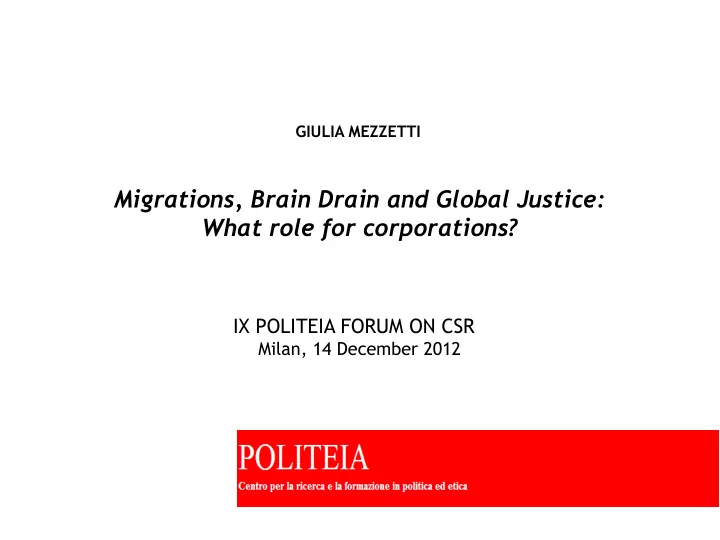

GIULIA MEZZETTI Migrations, Brain Drain and Global Justice: What role for corporations? IX POLITEIA FORUM ON CSR Milan, 14 December 2012
In what way are CSR and international migrations related? NEGATIVE OBLIGATIONS • Migrants' rights → HUMAN RIGHTS • Migrant workers’ rights → LABOUR STANDARDS POSITIVE OBLIGATIONS Skilled migrants and brain drain → DEVELOPMENT •
Corporations' negative obligations (1/2) Two points of view: • as “pull factors”: respect for human rights and guarantee of proper labour standards → no trafficking; → no discrimination, no exploitation • as “push factors”: respect for human rights → not causing harm to local populations, thereby obliging them to move
Corporations' negative obligations (2/2) • Legal-theoretical framework (soft law): OECD Guidelines, ILO Tripartite Declaration, UN Global Compact, UN Guiding Principles on Business and Human Rights; • Studies under way: → Business for Social Responsibility & ILO (reports e recommendations); → Institute for Human Rights and Business: “Business and Migration” initiative; → International Business Leaders Forum in partnership with the Institute for Human Rights and Business • Some examples: intiatives promoted by Unilever, Nike, Manpower, Timberland
Corporations' positive obligations (1/3) • Brain drain: skilled workers' migration to developed countries • Major issue in development studies and global justice debates, questioning the role and the choices of states, migrants and corporations, by posing three sets of ethical dilemmas: → for the migrant : human right to move VS positive duty to contribute to collective development; → for the state : duty to let people go AND duty to committ to development and to create opportunities; → for corporations : right to hire “the best and the brightest” VS positive duty to contribute to the development of the countries where they operate
Corporations' positive obligations (2/3) Ideas that have been put forward: • “Bhagwati” tax • Ethical recruitment • Codes of practice (health care sector) • Brain circulation
Corporations' positive obligations (3/3) • Examples of initiatives in partnership with International Organizations : HP & UNESCO “Brain drain initiative”; TOKTEN: UNDP Transfer of Knowledge through Expatriate Nationals ( = Brain Circulation). • Examples of CSR initiatives: eni: “dual flag” approach; BP: Project Management College.
In conclusion • The issues posed by international migrations fall within corporate social responsibilities; • There is a growing concern towards corporations' respect of migrants' rights; • The brain drain phenomenon can represent a new challenge for corporations' positive obligations and commitment to development: → private sector's potential roles are to be explored.
Recommend
More recommend